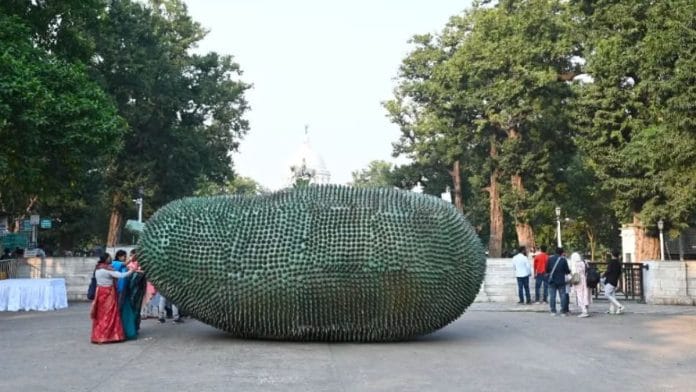Kolkata: In Bengal, art is beautifully handcrafted Durga idols, painstakingly hand-pressed mishti, and even a football sliding into the goalpost. Art is life. And to celebrate it, the state showcased its maiden biennale, ‘Anka-Banka’, spread across 26 venues across Shantiniketan and Kolkata through exhibitions, installations, workshops, and conversations.
In Bangla, anka means the act of drawing as well as the drawing itself, while banka means something indirect. When put together, ‘Anka-Banka’ could be pictured as a river meandering through a vast landscape, creating its own path.
Eight months ago, festival director Siddharth Sivakumar had an idea to hold an art festival in Tagore’s Shantiniketan. “The word got out when I started speaking to artists and institutions. A lot of artists reached out and soon the idea expanded, and a shape emerged. We understood this is something we cannot do every year—which was our initial plan—so it quite organically turned into a biennale,” Sivakumar told ThePrint.
In 2012, India witnessed its first art biennale in Kochi, an initiative by the Kerala government that wanted to attract artists and visitors from around the world. “Biennale in the art world is such a loaded word. There is a certain expectation and responsibility that comes along. It made perfect sense to have Shantiniketan and Kolkata merge through this art festival because Bengal has two schools of art: the Bengal school, led by Abanindranath Tagore, and Shantiketan, led by Rabindranath Tagore,” Sivakumar said.
Also read: Why West Bengal’s photography didn’t get the same global fame as Bangladesh’s images
Ecology, identity & a jackfruit
For artist Nikhil Chopra, the Bengal Biennale was a ticket to Shantiniketan. Through his 10-hour-long live performance at Gabaa in Shantiniektan, he blurred the lines between ecology and art, taking inspiration from the landscapes of Shantiniketan to address the realities of climate change. Artists Mithu Sen and Sanyasi Lohar painted murals with Ol Chiki script on mud walls at Pearson Palli in Shantiniketan—a reassertion of Santhal cultural identity.
“Each installation is thought-provoking and beautiful. It makes you reflect on the essence of life and our cultural identities. Art has a way of speaking out and the best part is, each person interprets it in their own way. Where else do you get this freedom?” said Shupti Dutta, a visitor. Her son Srupatim enjoyed the ‘MYTrutH’ exhibition, which debuted author Devdutt Pattnaik’s hand-drawn mythological illustrations.
A Biennale favourite was artist Paresh Maity’s sprawling bronze jackfruit sculpture at the Victoria Memorial entrance, greeting visitors of all ages. The spikes represented human habitation in tightly packed metropolitan spaces, transforming the fruit into a symbol of both allure and disillusionment.
“There was a lot of local interest. Since we were using museum spaces, there was an organic crowd, so people who otherwise would not be visiting such shows were being exposed to art in ways they had not imagined,” said Sivakumar.
For the festival director, the contention to hold a Bengal Biennale was to bring back focus on art in West Bengal. It was an opportunity to showcase artworks that would otherwise not be open for public viewing. According to curators, it was long overdue.
‘Anka-Banka’ closes on 6 January.
(Edited by Prasanna Bachchhav)






